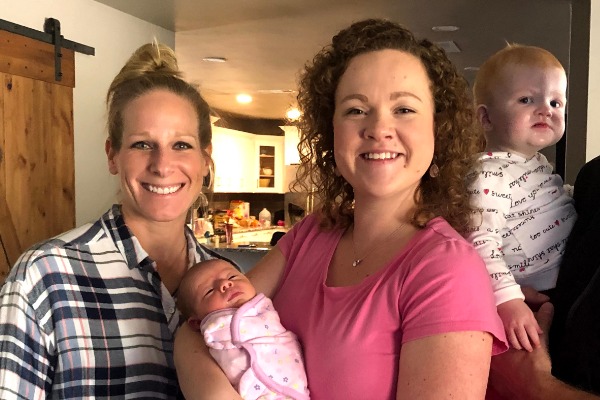"If I Want to Choose Adoption, Can I Be Forced to Keep My Baby?"

No. If you want to choose adoption, nobody can force you to keep your baby. It is always entirely your choice to place your baby for adoption. But, it’s normal to feel pressured by loved ones to follow a certain path, because you want their support — whether or not it happens to be for adoption. If you need immediate support, call 1-800-ADOPTION now.
Often, an expectant mother listens to her loved ones’ opinions (whether they agree with her or not) before making the choice that is best for her and her baby. However, if a loved one disagrees with her adoption decision, it can be complicated to move forward with her choice.
It’s not uncommon for women in your situation to think, “I want to give my baby up, but my mother is forcing me to keep the baby.” Or, “My boyfriend is pressuring me to keep the baby, even though I want to choose adoption.” Then you find yourself wondering, “What do I do?”
First and foremost, remember that no one can force you into any decision you are uncomfortable with. As the mother of your baby, you are the only one who can choose what is best for you and him or her. You should never feel coerced into a certain unplanned pregnancy option, no matter how old you are.
“When I had been home a few months, it became even clearer that I had made the right decision. There is no reason to be ashamed of my decision, even though not everyone was going to agree with my choice. I knew I had done what was best for Theodore. I gave him the best possible future, filled with unconditional love, financial stability, education and so much more! ,” said Sara about her decision to embrace adoption for her baby.
If you are considering adoption but facing resistance from your parents or others in your life, we encourage you to contact our adoption specialists at 1-800-ADOPTION to get guidance and advice on moving forward with your adoption plan.
Helpful Information
Why People May Disagree with Your Adoption Decision
If your family is resistant to your adoption plan, know that this is a more common situation than you may think. Unfortunately, adoption is still a taboo subject for many people in the U.S. — mainly because many people still have an outdated and negative view of this process.
In the past, adoption was a very secretive process, one that many women were embarrassed of. It was common for expectant mothers to be forced into closed adoptions, in which they could not pick families for their babies and were never given the chance at an open adoption relationship. This, along with the persistence of adoption-negative terms like “give up a baby,” creates an existing negative misunderstanding of what adoption is really like.
If you’re thinking, “I want to give my baby up, but my mother is forcing me to keep the baby” (or if any loved one is rejecting your adoption decision), consider this: Do they really understand how adoption works today and the advantages it brings to all members of the adoption triad? Or do they view adoption as a negative, selfish choice of “giving away a baby” and never seeing them again?
In most cases, your family members and friends who resist your adoption decision likely have no proper understanding of the modern adoption process. If you are facing pressure to parent a child before you are ready, one of the first things you should do is explain what adoption is really like.
Explaining Adoption to Loved Ones
Adoption is an emotional concept to accept — not just for you but also for any loved ones because they may feel like they may be “losing” a grandchild, niece/nephew, sibling, etc. Therefore, to help them accept your decision and to repair any strained relationships, it’s critical to explain exactly what adoption is like.
As you do so, make sure to debunk these myths they may believe:
-
"Adoption is 'giving away' your baby." While you will place your child with another family, it’s not an easy, flippant decision to make. Explain that you thought long and hard about your adoption decision and, even though it’s not easy, you know that giving your child a life with parents more prepared than you is the best path for all involved. You are putting your baby’s best interests first, not taking “the easy way out.”
-
"You will never see your baby again." The majority of birth mothers today have post-placement relationships with their baby and the adoptive parents, and you will be in charge of what kind of contact that is. As your child grows up, they will know about you and their adoption, and their adoptive parents will celebrate that part of their history. You will have the chance to choose the adoptive parents you wish to adopt your baby and develop a relationship with them during and after the adoption.
-
"Adoption agencies force you to 'give up' your baby." Explain that you are always in charge of your adoption decision, and you always have the right to change your mind until you sign your adoption consent. While you should emphasize that you have made this decision and don’t anticipate changing your mind (no matter what your loved one says), reminding them that you have control could help alleviate some of their fears for you.
When a loved one disagrees with your adoption decision, it can be helpful to try to educate them on the realities of adoption today and all the reasons why you feel this is the best decision for you and your baby. But also remember that it is not your job to convince others; as long as you are doing what is right for you and your child, that’s all that matters.
Understand Where They are Coming From
If you are in a situation where you are thinking, “I want to give my baby up, but my mother (or father, sibling, boyfriend, etc.) is forcing me to keep the baby,” try to consider your loved ones’ way of thinking, rather than fighting with them or trying to prove them wrong. Even if you happen to be younger and living in your parents’ house, it does not mean they automatically have the right to choose for you — but it can be incredibly helpful to have their support.
Often, if a prospective grandmother or grandfather is trying to “force” you to keep your baby, it’s because they want you to take responsibility for your actions that led to your unplanned pregnancy. They may be wary about “handing over” their flesh and blood to a complete stranger. More than anything, they are probably worried about how the adoption process will affect you as a prospective birth mother. In a misguided way, they may be trying to save you from the pain and grief of placing a child for adoption — without considering the equally difficult emotions you’ll have if you have to unwillingly parent your baby before you are ready.
Once you take the time to listen to their concerns, gently explain why they are unfounded. Explain that, yes, you are taking responsibility for your actions by placing your child for adoption; you are making the brave, educated decision to recognize when you cannot provide the life you want for your child. Offer to have your loved ones meet the adoptive parents or look at their profile to better understand the “strangers” adopting your baby, and explain that your adoption specialist will always be there to help you through your emotions, during and after your adoption, completely for free.
Still Feeling Pressured into Parenting?
If you take these steps and are left thinking, “I want to give my baby up, but my mother is still forcing me to keep the baby,” please contact our adoption specialists right away.
This decision is no one else’s but your own, and you should never be pressured into an unplanned pregnancy choice that you are not comfortable with. Even if you are a minor, your parents cannot make this decision for you. Still, if you are concerned about a lack of support should you choose adoption, know that our specialists are here to provide emotional and case management services, as well as financial support to assist you throughout your pregnancy.
Remember this: Adoption is always an option for you, even if you have unsupportive parents or other family members. American Adoptions is here to help. Please call 1-800-ADOPTION to get more information.
Disclaimer
Information available through these links is the sole property of the companies and organizations listed therein. American Adoptions provides this information as a courtesy and is in no way responsible for its content or accuracy.







































